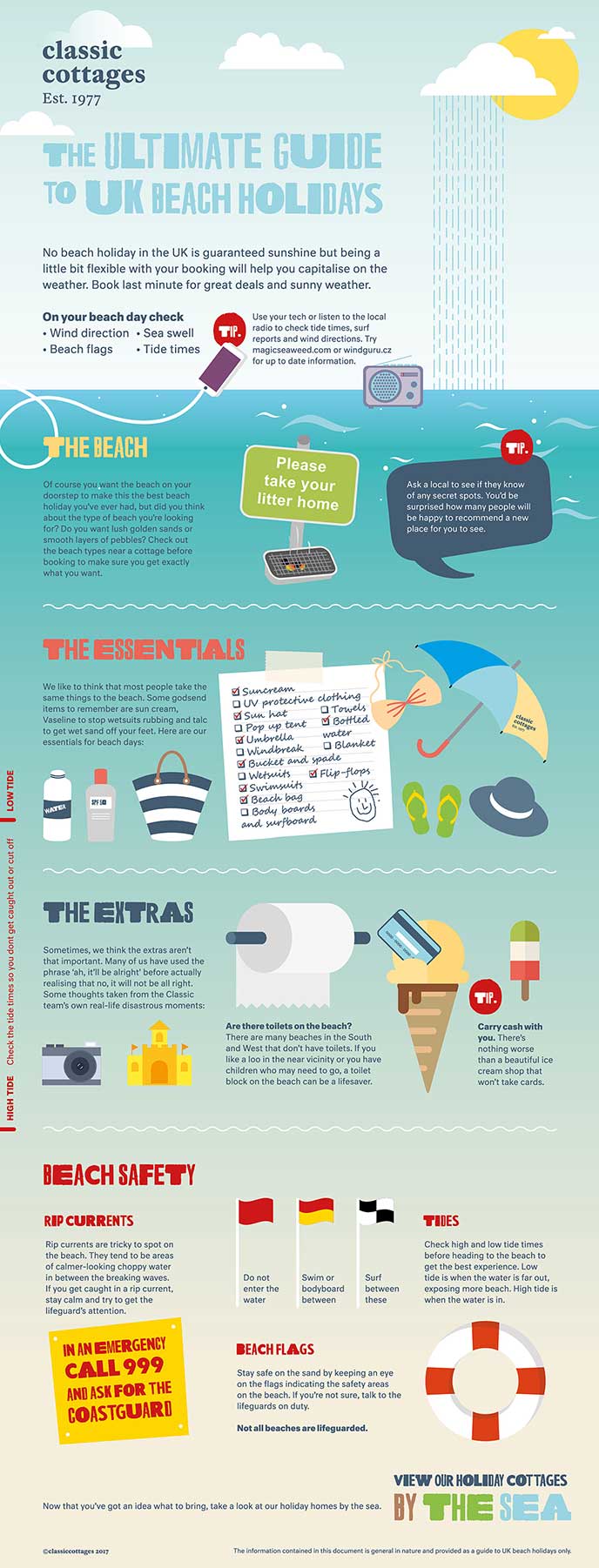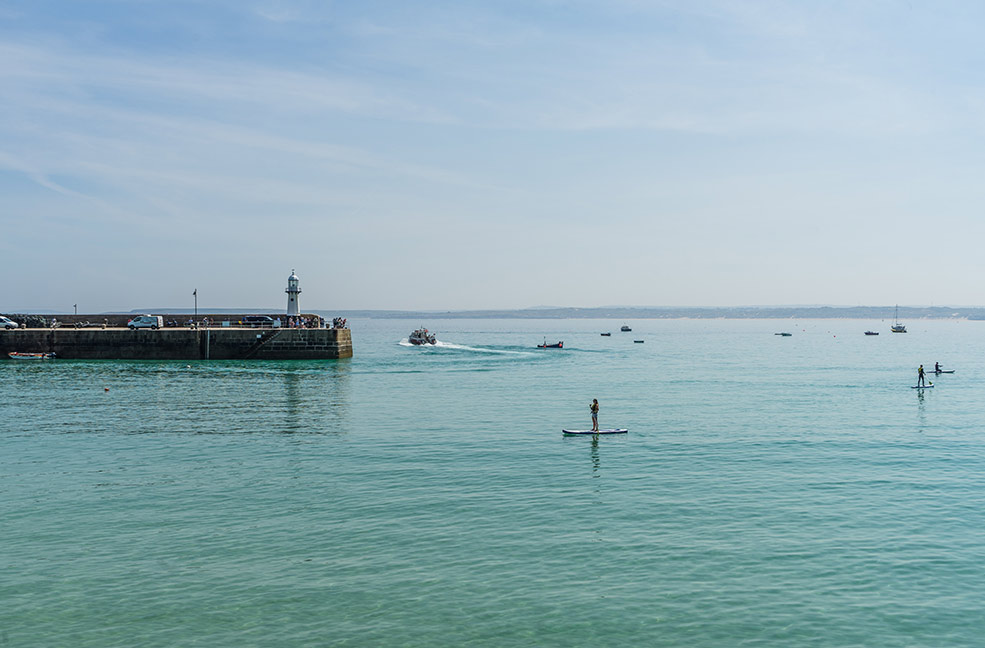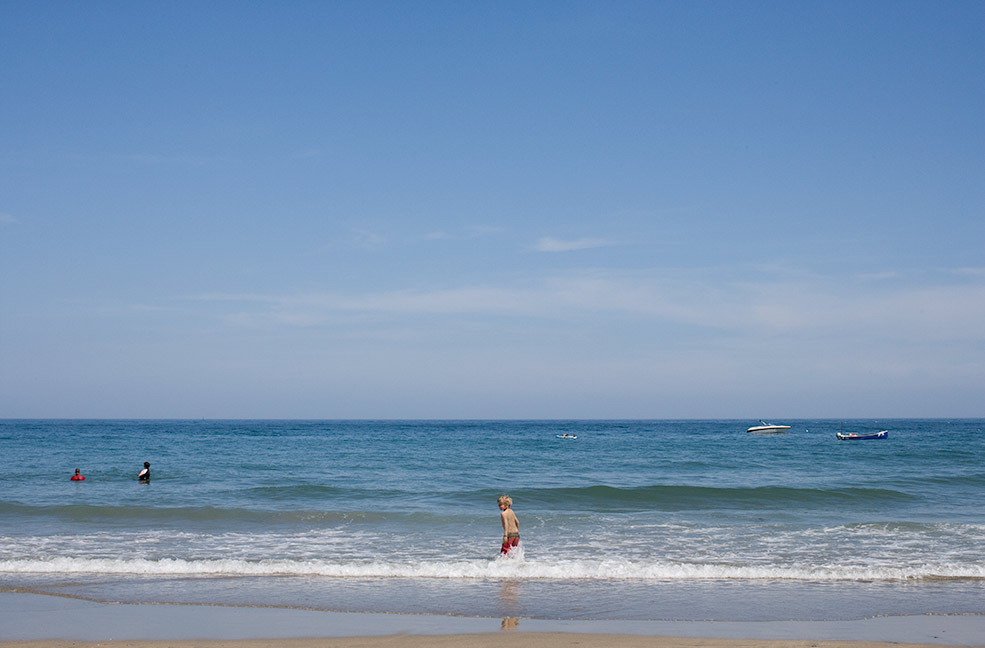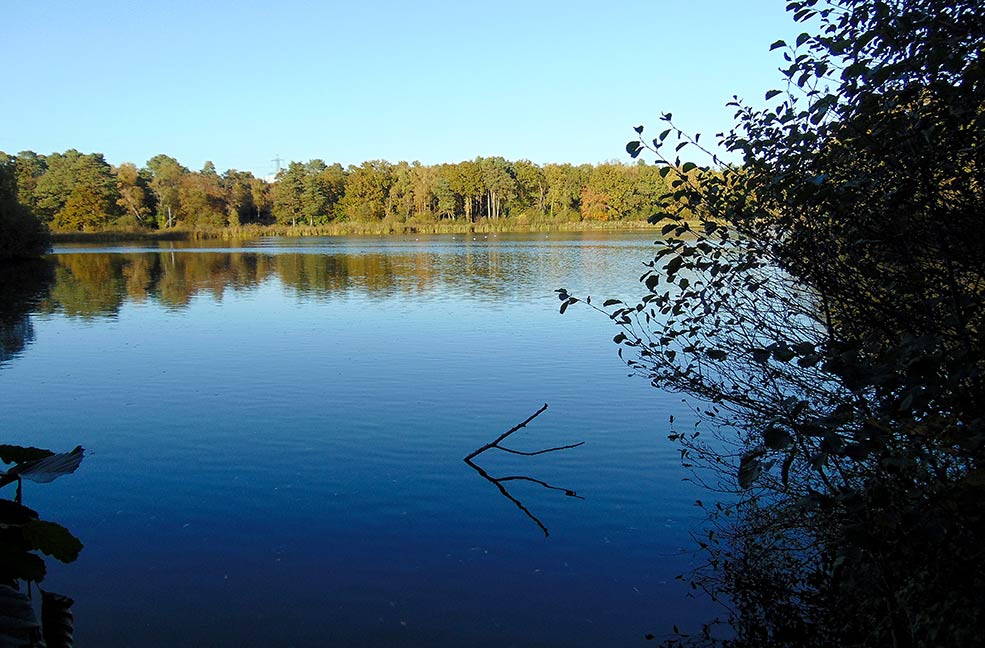With the island nation of the UK blessed with thousands of miles of coastline, it is one of the best places in the world for seaside breaks and attracts everyone from bronzed beach-bathers to wildlife researchers to top water-sports athletes. Whether you’re looking for somewhere quiet to dream away the hours or a great family-friendly beach to entertain all generations, there’s somewhere for you along the UK’s salt-kissed coast. There’s just one thing: how do you know what to pack for a UK beach holiday?
If you can feel yourself start to break out in a cold sweat at the mere thought of what to take to the beach in the UK – fear not. Stick with us. With combined beach expertise of who-knows-how-many centuries between us, we’ve got beach packing down to a fine art. Coupled with our top tips about logistical, safety and entertainment considerations, we’ll help you fully prepare for your British beach holiday – whichever coast you’re heading to. So, without further ado, here are our top tips for choosing your destination and beach packing essentials for the best UK seaside holiday.
Find out more
The beach
The conditions
The packing essentials
The beach
What kind of beach person are you?

The UK boasts every kind of beach imaginable, all the way from the Caribbean-esque, white-sand beaches of the Hebrides to the rocky, vegetation-clad coves of Cornwall. Needless to say, you’ll be spoilt for choice when it comes to picking your beach holiday, so it’s important to consider what kind of beach person you are (yes, it’s a thing) and the kind of activities, facilities and aesthetics you’d prefer. Cove or bay? Dune or cliff? Pebble or sand? Secluded or close to the action? Wave magnet or mill pond? Beaches come in all types of beautiful forms, and these are all things to think about when considering where you’d like to visit.
Explore our collection of coastal properties across the UK.
Beach inspiration:
Best beaches for surfing in the UK: Woolacombe, Devon; Fistral, Cornwall; Newgale, Pembrokeshire
Best beaches for fossil hunting in the UK: Charmouth, Dorset; Meon Shore, Hampshire; the Isle of Sheppey, Kent
Family-friendly beaches
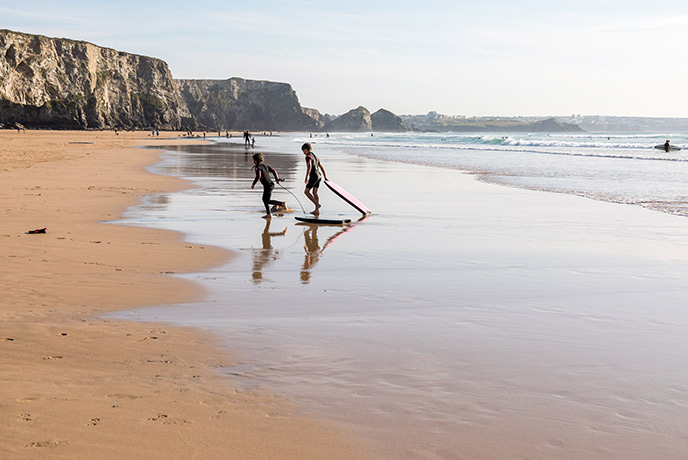
If travelling with young children, charged teens or elderly parents, there are some important things for you to consider during a beach holiday in the UK. For instance, if you're interested in swimming and watersports, then lifeguard cover is a priority, while facilities such as nearby parking and places to eat, access ramps and toilets may also be important to you. For some, having easy access to golden sands is a real treat, while for others, the adventure lies in following the coast path to more secluded coves for wild and peaceful days by the shore. Whatever you’re looking for, the UK is home to every type of beach, perfect for the ultimate beach day with your family.
Beach inspiration:
Best family-friendly beaches in the UK: Brighton, Sussex; Bude, Cornwall; Broadstairs, Kent
Best beaches for safe bathing in the UK: Lulworth Cove, Dorset; Blackpool Sands, Devon; Compton Bay, Isle of Wight
Dog-friendly beaches
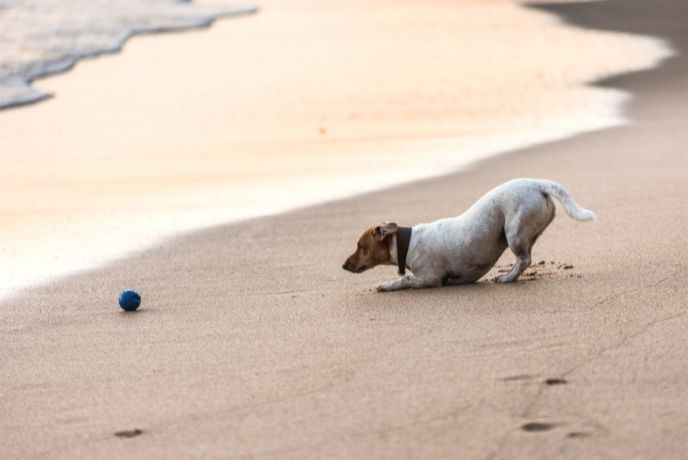
There is nothing better than absconding from the daily grind and enjoying a well-deserved dog-friendly holiday with your wet-nosed pal. Tempted by the lure of salty air and boundless stretches of open sand just perfect for scattering paw prints, beach breaks offer both you and your pup the chance to relax, revive and rejuvenate together. If you’re staying in one of our dog-friendly cottages, why not plan your break around the best year-round dog-friendly beaches in the area? While there are a huge number to choose from, many of the UK’s beaches are subject to partial or seasonal restrictions, so keep this in mind when booking.
Beach inspiration:
Best dog-friendly beaches for walks in the UK: Perranporth, Cornwall; Brean Beach, Somerset; Elmer Sands, Sussex
Best dog-friendly beaches with views in the UK: Broad Sands, Devon; Durdle Door, Dorset; Barafundle Bay, Pembrokeshire
The conditions
Beach features
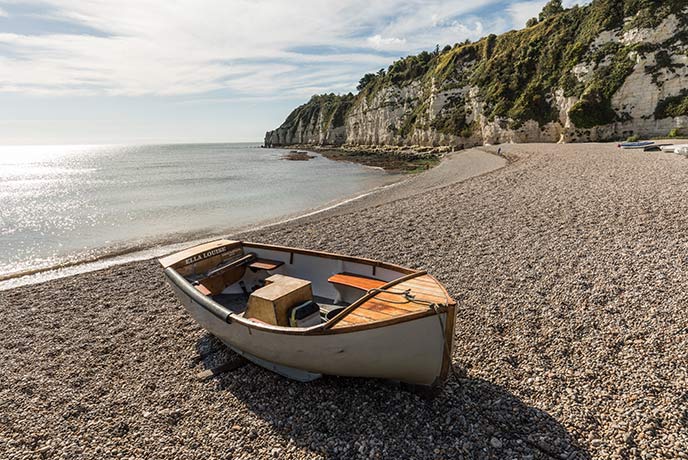
When choosing your beach, it’s important to consider its various features so you can decide whether it’s the right one for you. Some of these include its shape, size, aspect and shelf. For example, east coast beaches are amazing for sunrises, while on sheltered south-facing beaches, suntrap spots can often be enjoyed even in the middle of winter. Beaches with gently-shelving shores are often safer for swimming, while those with a steeply-shelving bank can produce a heavy ‘shore dump’, in which case swimming should be avoided. For the best advice, check out local maps, get in touch with regional tourism boards and speak to local lifeguards for the best insider knowledge.
The weather
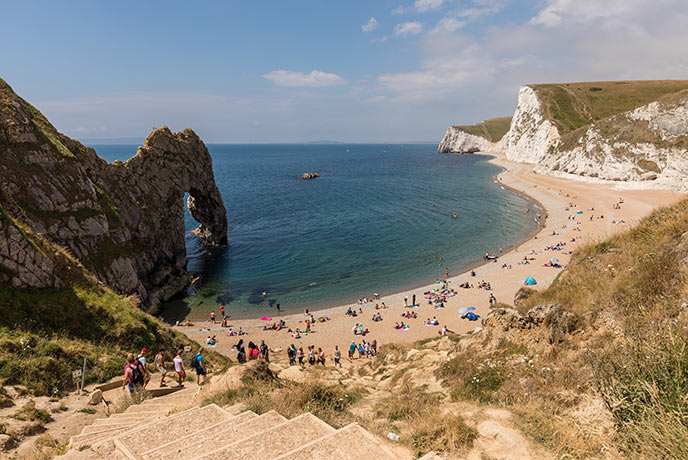
One of the best things about beaches in the UK is their year-round allure. With each season offering its own unique beauty and appeal, you don’t have to wait for summer to make footprints in the sand. While summer tempts with golden sunshine, warmer sea temperatures and lots of activity, winter brings its own appeal with blustery dog walks and, if you’re lucky, superb storms that make for incredible viewing when seen from a sea-view cottage.
In the shoulder months of spring and autumn, the throngs disperse and the UK’s beaches often seem to double in size – void of crowds and topped with gorgeous blue skies. And, though it’s true that the weather in the UK can be a little, shall we say, mercurial, you can easily pack accordingly. To stay ahead of the game and the clouds, keep up to date with local weather stations and take warm and waterproof layers with you. That way, no matter what the weather throws at you, you’ll stay high and dry.
The sea
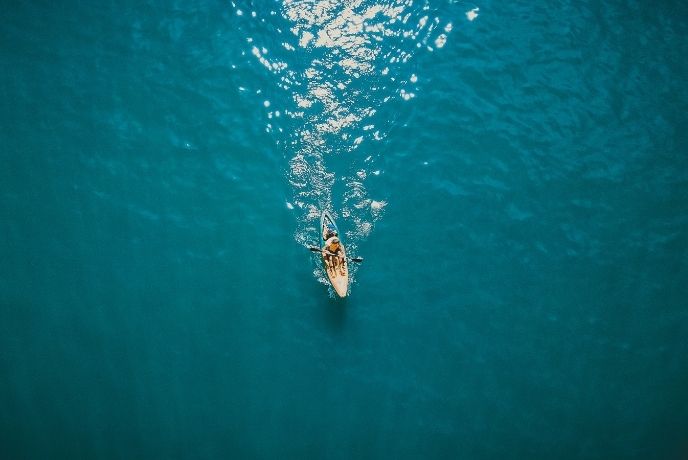
Whether you’re a water-baby or land-lover, you should always be aware of the sea when spending a day by the shore – both for enjoyment and for safety. Depending on which coast your favourite beach lies, its aspect and its terrain, it can offer all kinds of different conditions to suit different interests. For example, some beaches have great reef breaks, and when coupled with a light offshore wind, are perfect for surfing. Others proffer opportunities for windsurfing, swimming, paddleboarding, kayaking, snorkelling and more, so check the weather and local resources and remember to pack your gear.
While there are lots of safety aspects to be aware of, two of the most important are tides and rip currents. The first, tides, are the rise and fall of the sea caused by the gravitational forces of both the moon and the sun. There are two low tides and two high tides every day, and you should know the timings for each so as to avoid being cut off by the sea. The second, rip currents, are strong currents that run in channels away from the beach, easily capable of pulling you out to sea. If you don’t know how to spot them or what to do if you get caught in one, read our guide to rip currents here.
The wildlife
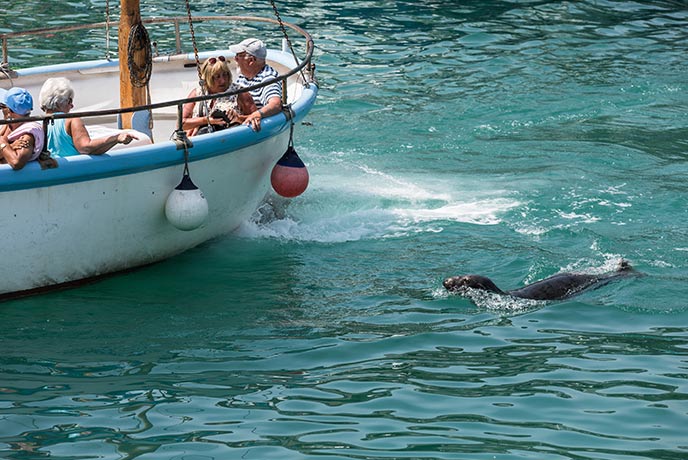
We share our coast with some incredible wildlife, from brightly coloured sea anemones, to huge seabird colonies, to giant basking sharks cruising along the coast. Though some species can pack a punch (including Portuguese man o’war jellyfish and weever fish), most are completely harmless to humans – making the UK’s coast one of the safest in the world for beach holidays. That said, to protect both yourself and the wildlife, and to encourage local ecosystems to thrive, it’s always best to admire all wildlife from afar and put plenty of space between you. If you’d like to go that extra mile, you can also use litter pickers to pick up any debris that you find, including ocean plastic and rope.
Lifeguard flags
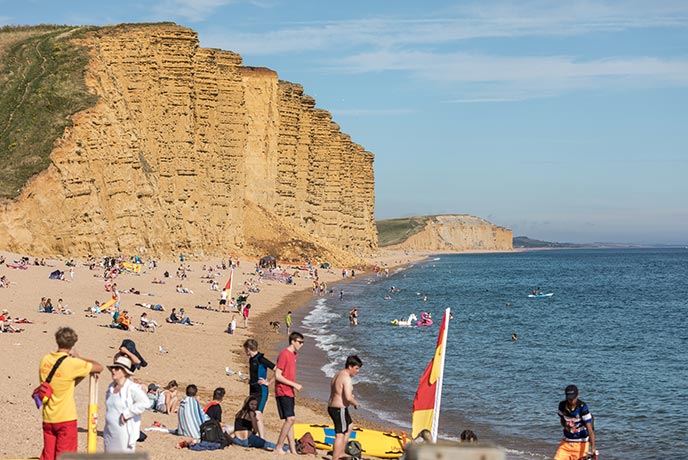
On lifeguarded beaches, you will see various flags that can change from day to day. These flags all indicate different conditions, so it’s important to pay attention to what they mean. Red and yellow flags indicate lifeguarded areas and the safest places to swim. Black and white chequered flags indicate non-swim zones and show you where you can surf, paddleboard, kayak and more. Orange flags mean that there are strong or offshore winds and red flags indicate danger – you should never go in the water when a red flag is flying.
The packing essentials
For the complete round up of the best things to take to the beach, here’s our full UK beach holiday packing list. Replete with UK beach essentials and handy must-haves, it includes everything from eco-friendly sun cream to waterproof phone cases to quick-dry towels.
Clothing

Even if you plan on shedding the layers pretty quickly, clothing is a really important part of any UK beach holiday packing list. For maximum warmth and minimum bulk, lightweight thermal layers are always the best way to go, giving you plenty of choice for comfort and warmth – even in summer, cool sea breezes can take the edge of the sun’s warmth, while in the evening temperatures can quickly dip. For multi-purpose daytime use, items like peshtemals can be used as towels, blankets and clothing for both men and women.
Essentials
• Sun hats
• Warm layers
• Swimwear
• Beach cover up
• Lightweight waterproof
• Sunglasses
Extras
• Peshtemal
• Swim nappies
• Reading glasses
Footwear
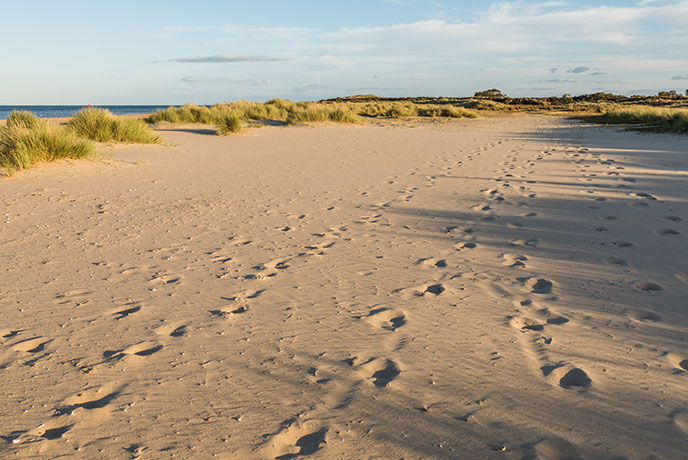
Whether you are wandering across a shingly shore, stomping along the coast path or simply strolling down from the beachfront car park, appropriate footwear is one of the key things to take to the beach in the UK. Depending on the type of beach you’re heading to, how far you have to walk and any additional support you may need, you can slip on some decent sandals or opt for sturdier walking boots to carry you the extra miles.
Essentials
• Sturdy walking shoes
• Flip flops
Extras
• Waterproof sandals
• Mesh slip-on reef shoes
• Surf boots
• Flippers
Toiletries
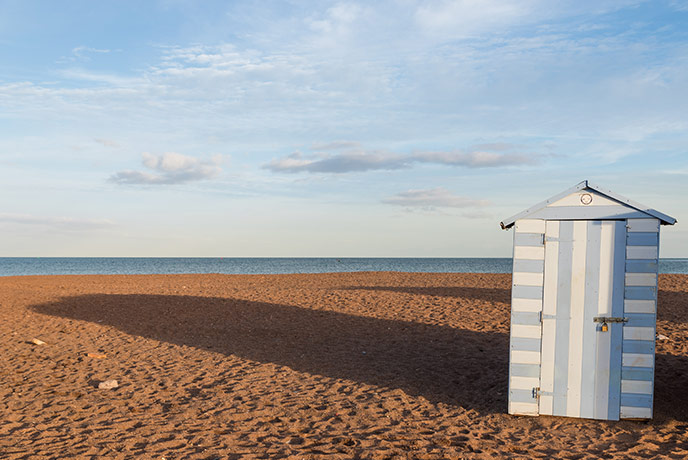
While most of your toiletries will be left at home in your holiday cottage, it’s still a good idea to pack some must-haves and comforters into your beach essentials kit. Of course, reef-safe sun cream should be at the very top of the list to protect you from the sun in both summer and (often deceptive) winter sunshine. To help look after the environment and protect our fragile seas, you can opt for an eco-friendly sun cream, which contains non-toxic ingredients rather than the traditional, harmful chemicals that pollute our waters.
Essentials
• Eco-friendly sun cream
• Hand sanitiser
• Lip balm
• Personal medication
• First aid kit
• Tissues
Extras
• Aloe gel
• Hair brush
• Painkillers
• Tweezers
• Antihistamines
• Safety pins
Accessories
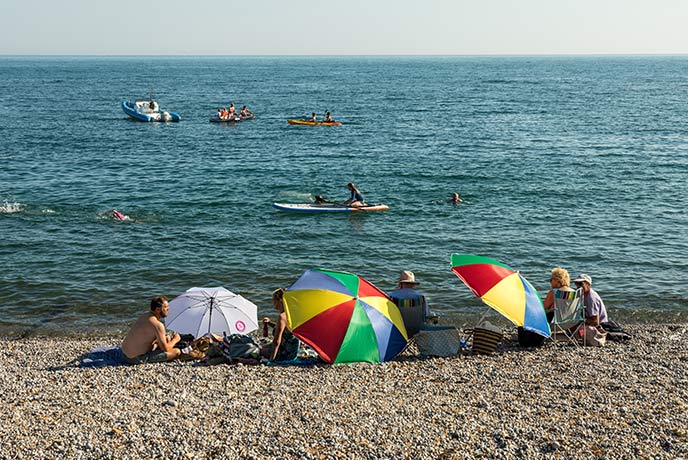
Depending on your objectives and where you are going, there are all sorts of additional accessories and extras that you can bring with you to make your day by the sea more comfortable and enjoyable. Able to be tailored to meet your needs, our list of things to take to the beach covers everything from waterproof equipment to beach chairs, so all the family can make the most of shoreside adventures.
Essentials
• Beach mat
• Beach towel, peshtemal or micro-fibre towel
• Beach bag (+ spare)
• Trug or rubber bucket to carry gear/wet clothing
• Umbrella*
• Camera
• Phone and waterproof phone case
• Portable charger (in case of emergencies)
*If you have an umbrella with you, you’ll always be covered. Rain? Pop up your brolly and keep off those watery globules. Too much sun? Sit under your umbrella for a bit of respite.
Extras
• Beach chairs
• Dry bag
• Mesh bag
• Waterproof speakers (keeping volume to a respectful level) or headphones
• Underwater camera (with float strap)
• Wind breaker
Food and drink
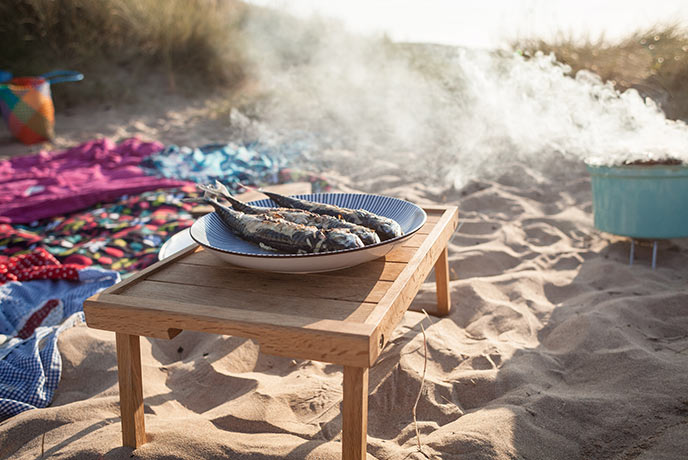
Needless to say, one of the best things to take to the beach in the UK – and everywhere else for that matter – is a good ol’ picnic. Particularly important if you are heading to a beach with limited or no facilities, adequate food and water supplies will fuel relaxation and play, and prolong your days by the shore. If you are feeling romantic, you can even pop a bag of ice and a bottle of fizz into a cool bag for a lovely evening overlooking a twinkling sea. Just remember to take all your leftovers home with you.
Essentials
• Water (lots)
• Snacks
• Picnic blanket
• Reusable Tupperware or zip-lock bags
• Cutlery
• Bottle opener (well, why not?)
Extras
• Cool bag
• Money to purchase food and drink
• Reusable barbeque
Things to do
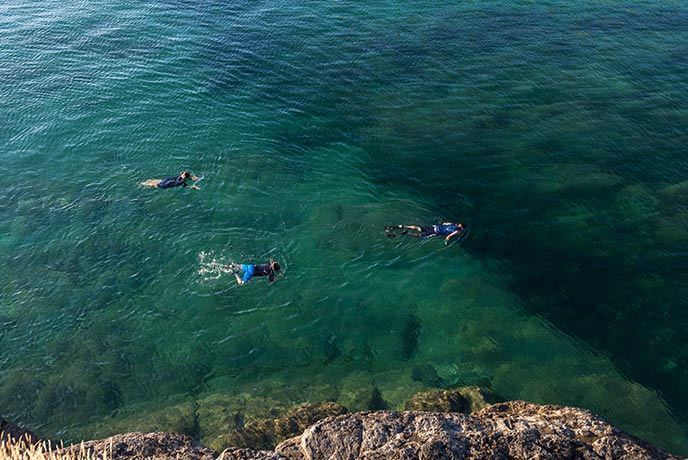
Simply sitting back and relaxing to the sound of lapping waves and crying gulls is a really wonderful way to spend a few hours, or the whole day, by the sea. That said, if you find yourself feeling restless or have little ones to entertain, there are plenty of things you can bring with you to keep you busy, including books, beach games, boards and more. We find one of the best things to bring to the beach is a ball to generate hours of nostalgic fun for all the family (two-legged and four) - just be sure to find an empty spot.
Essentials
• Bats and balls
• Frisbee
• Reading book
• Wetsuit or rashie
Extras
• Armbands
• Bucket n’ spade
• Sand toys
• Boards and carry straps: bodyboard, surfboard, SUP board etc*
•Snorkel and mask
*To make your holiday even lighter on you and the planet, you can hire a variety of boards at many beaches around the UK
Doggy must-haves
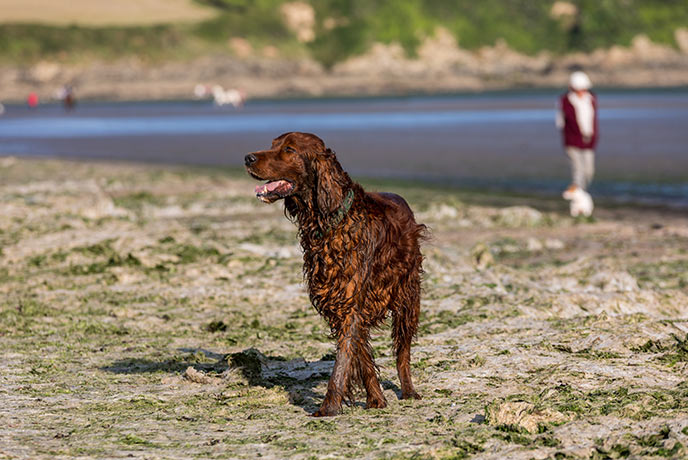
If you are holidaying with your canine companion, there are certain must-haves to include in your list of what to pack for a beach holiday. A form of shelter from the sun (umbrella, pop up tent or windbreaker), water bowl and food, pooh bags and a ball are all must-haves. You should also be mindful of the environment, making sure that the sand isn’t too hot, and that you don’t have to walk too far to reach the beach. To help your dog keep cool in summer, you can buy sun reflective cooling dog coats, and to keep them warm in winter, fleecy towel jackets.
What to leave at home

From the dangerous to the destructive to the simply distracting, here are some of the things that we advise you leave out of your beach packing list this year.
• Single-use plastics – instead, opt for items, packaging and beach toys that can be re-used and recycled
• Inflatables – the RNLI advises that inflatables, blow-up toys and airbeds shouldn't be taken to the beach as they can easily be swept out to sea
• Disposable barbecues – these are one of the main culprits of beach pollution and should instead be swapped for reusable options
• Work – unless you really have to, we fully advise leaving all work at home and simply embracing the moment!
If you can’t wait to book your holiday by the sea, take a look at our cottages by the sea and look forward to your very own salt-kissed adventures.


